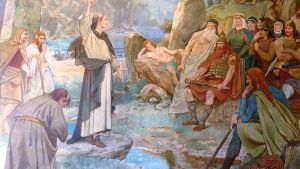Lenten Campaign 2025
This content is free of charge, as are all our articles.
Support us with a donation that is tax-deductible and enable us to continue to reach millions of readers.
Over the centuries various traditions were developed to commemorate the holy season of Lent and to help parishioners embrace its spiritual character. This was expressed in different ways throughout the world.
The people of Ireland, “the land of saints and scholars,” have their share of traditions passed down from one generation to the next.
Here are four such traditions that your Irish grandma would have been familiar with.
Shrovetide
During the week prior to Lent the Irish had various traditions to prepare for the penitential season. It was customary, as in other places, to confess your sins to a priest. Shrovetide was also seen as a time to clear the house of food that couldn’t be consumed during Lent. For the Irish this meant, “Pancake Day” on the Tuesday before Lent, where everyone would make pancakes with the soon-to-be-forbidden ingredients — eggs, butter, and milk.
Additionally there was a tradition known as “Clipping Thursday.” Hair and nails were trimmed prior to Lent, as they wouldn’t be trimmed until Holy Thursday. This some people did in honor of Christ’s Passion.
Lenten sacrifices
Lent in Ireland is a time to give up various pleasures for 40 days. Smoking and drinking in particular were signaled out as activities that would be abstained from during Lent. People were also encouraged to observe other personal sacrifices during the solemn season.
Fasting was also especially rigorous in Ireland, with many different foods forbidden, such as meat, butter, eggs, and dairy. Three days in particular were days of a “black fast,” where little food was eaten. This included Ash Wednesday, Spy Wednesday (Wednesday of Holy Week), and Good Friday.
St. Patrick’s Day
The one respite during Lent was always St. Patrick’s Day. It is a day of great celebration in remembrance of the “Apostle of Ireland.” All sacrifices are suspended for this joyous solemnity. Hymns, such as “St. Patrick’s Breastplate,” are sung in all the churches in honor of St. Patrick and it is a holy day of obligation.
Crosses and shamrocks are worn in honor of St. Patrick and his missionary deeds in the country.
Penitential pilgrimage
Ireland has a long history of pilgrimage to holy sites both during and outside Lent in atonement for sins. In fact, it dates back to the time of St. Patrick when he spent the 40 days of Lent on Croagh Patrick.
There are a number of paths in Ireland that were frequented by medieval penitents and recently these routes are receiving renewed interest as a pilgrimage route similar to the Camino in Europe.

Read more:
Walk along Ireland’s own “Camino” pilgrimage route

Read more:
Archaeologists find the cell of St. Columba, one of the “Twelve Apostles of Ireland”

